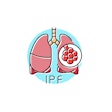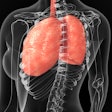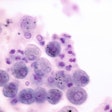
Johnson & Johnson presented new data from its phase 3 MARIPOSA study at the 2025 European Lung Cancer Congress (ELCC). The study evaluated Rybrevant (amivantamab-vmjw) plus Lazcluze (lazertinib) in patients with locally advanced or metastatic non-small cell lung cancer (NSCLC) with epidermal growth factor receptor (EGFR) exon 19 deletions or L858R substitution mutations.
The company projects median overall survival improvement to exceed one year with much-anticipated overall survival analysis showing statistically superior result of the combination therapy versus osimertininb as first-line treatment.
“Patients with EGFR-mutated non-small cell lung cancer deserve to live longer and with more hope than current treatments provide,” said Yusri Elsayed, MD, MHSc, PhD, global therapeutic area head at Johnson & Johnson Innovative Medicine, in a press release. “These newest and compelling overall survival data for first-line treatment with Rybrevant and Lazcluze are fundamentally changing treatment discussions and transforming expectations for how long patients can live.”
Rybrevant is an antibody therapy that uses immune cell-directing activity to target EGFR. Prior data from the phase 3 MARIPOSA study led to the European Commission’s approval of the treatment. The biologic is also being studied in multiple clinical trials in NSCLC, including the phase 2 COCOON study and phases 2 and 3 of the PALOMA-2 study.
“The chemotherapy-free regimen of Rybrevant plus Lazcluze represents a major breakthrough, offering an innovative and life-extending option that can meaningfully impact lives,” said Henar Hevia, PhD, senior director, EMEA therapeutic area lead, oncology, at Johnson & Johnson Innovative Medicine.





















